Organisational Behaviour Report: Assessing David & Co. Ltd's Dynamics
VerifiedAdded on 2020/10/23
|18
|5709
|119
Report
AI Summary
This report delves into the realm of organisational behaviour, using David & Co. Ltd as a case study to examine the influence of culture, power, and politics on employee actions and overall company dynamics. It explores various cultural models, including Handy's and Hofstede's dimensions, to understand how organisational structures and societal factors shape workplace behaviour. The report further investigates the different types of power, such as coercive, reward, legitimate, referent, and expert power, and how these impact employee motivation and performance. It then evaluates the impact of globalisation and digital technology on the business environment. Additionally, the report analyses motivation theories, including content theories like Maslow's Hierarchy of Needs and process theories, to assess how they influence employee behaviour and the effective achievement of organisational goals. The report also touches upon the importance of emotional intelligence, soft skills, and different leadership styles in fostering a productive and positive work environment.
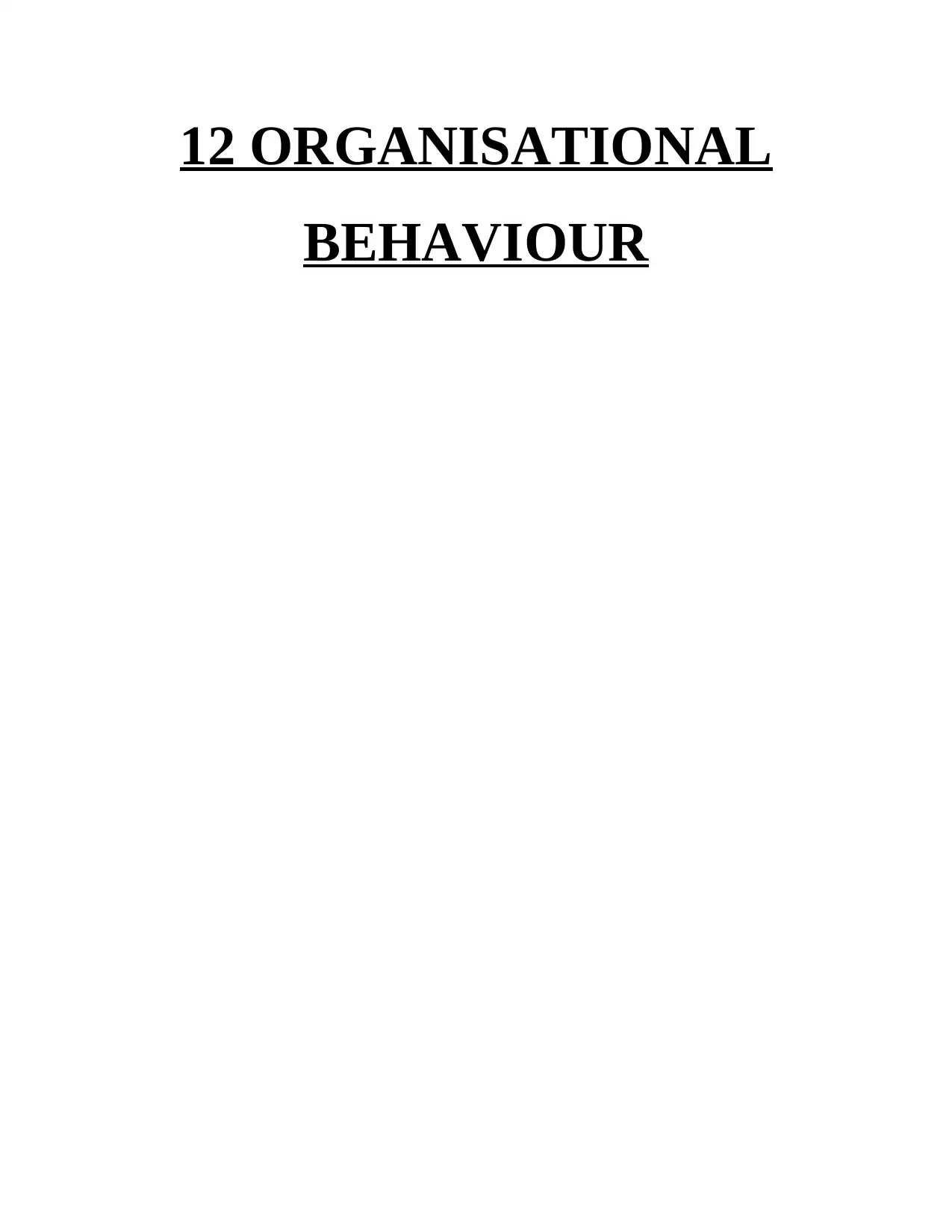
12 ORGANISATIONAL
BEHAVIOUR
BEHAVIOUR
Paraphrase This Document
Need a fresh take? Get an instant paraphrase of this document with our AI Paraphraser
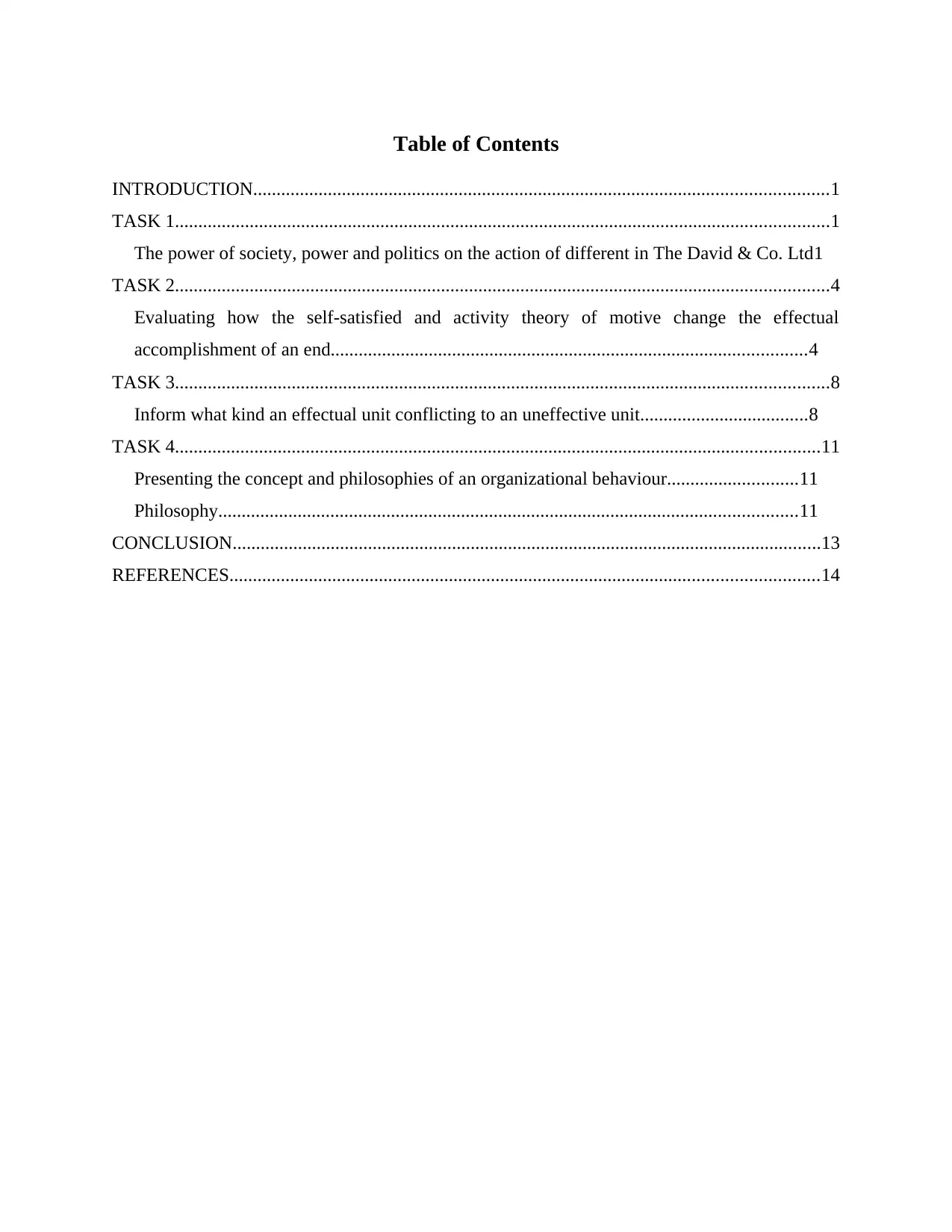
Table of Contents
INTRODUCTION...........................................................................................................................1
TASK 1............................................................................................................................................1
The power of society, power and politics on the action of different in The David & Co. Ltd1
TASK 2............................................................................................................................................4
Evaluating how the self-satisfied and activity theory of motive change the effectual
accomplishment of an end......................................................................................................4
TASK 3............................................................................................................................................8
Inform what kind an effectual unit conflicting to an uneffective unit....................................8
TASK 4..........................................................................................................................................11
Presenting the concept and philosophies of an organizational behaviour............................11
Philosophy............................................................................................................................11
CONCLUSION..............................................................................................................................13
REFERENCES..............................................................................................................................14
INTRODUCTION...........................................................................................................................1
TASK 1............................................................................................................................................1
The power of society, power and politics on the action of different in The David & Co. Ltd1
TASK 2............................................................................................................................................4
Evaluating how the self-satisfied and activity theory of motive change the effectual
accomplishment of an end......................................................................................................4
TASK 3............................................................................................................................................8
Inform what kind an effectual unit conflicting to an uneffective unit....................................8
TASK 4..........................................................................................................................................11
Presenting the concept and philosophies of an organizational behaviour............................11
Philosophy............................................................................................................................11
CONCLUSION..............................................................................................................................13
REFERENCES..............................................................................................................................14

⊘ This is a preview!⊘
Do you want full access?
Subscribe today to unlock all pages.

Trusted by 1+ million students worldwide
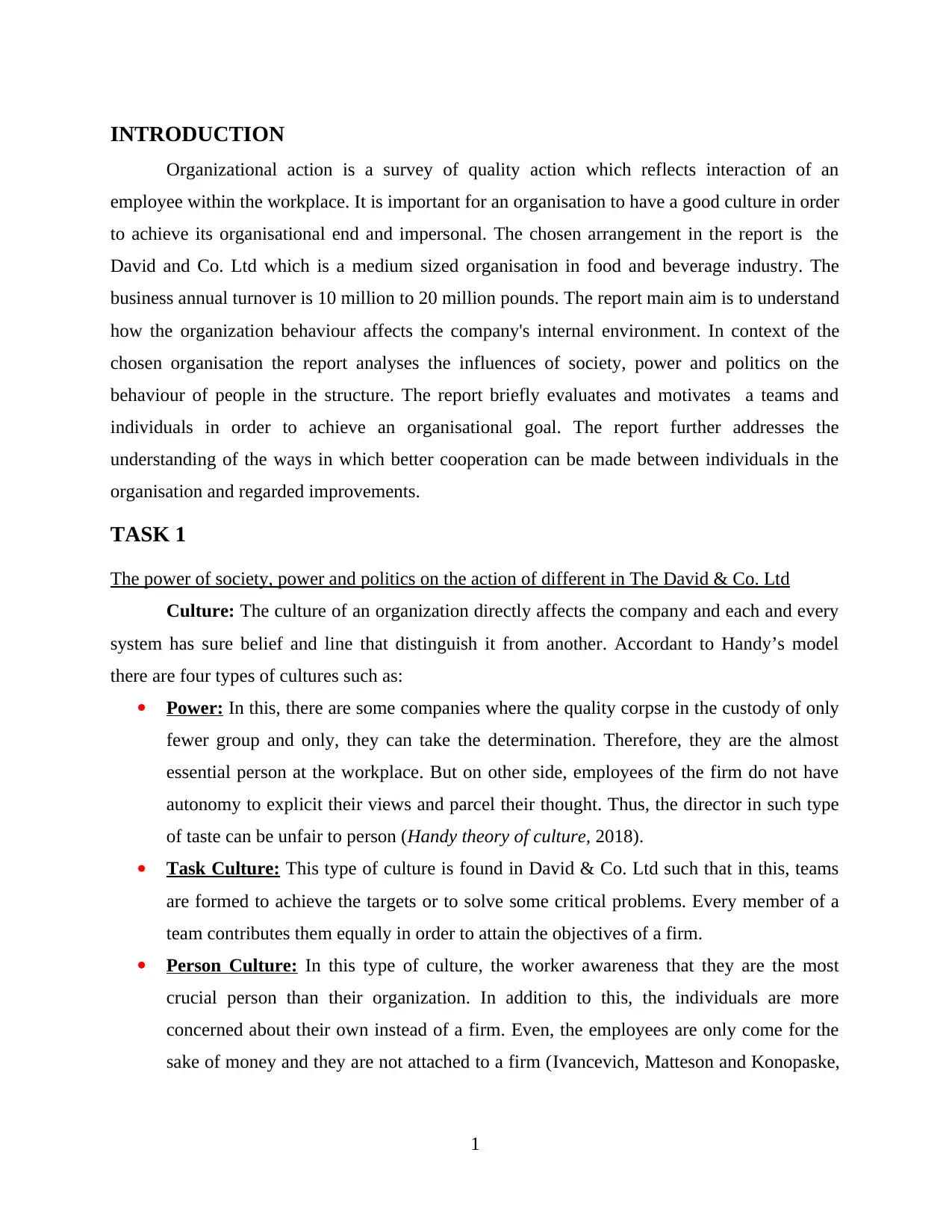
INTRODUCTION
Organizational action is a survey of quality action which reflects interaction of an
employee within the workplace. It is important for an organisation to have a good culture in order
to achieve its organisational end and impersonal. The chosen arrangement in the report is the
David and Co. Ltd which is a medium sized organisation in food and beverage industry. The
business annual turnover is 10 million to 20 million pounds. The report main aim is to understand
how the organization behaviour affects the company's internal environment. In context of the
chosen organisation the report analyses the influences of society, power and politics on the
behaviour of people in the structure. The report briefly evaluates and motivates a teams and
individuals in order to achieve an organisational goal. The report further addresses the
understanding of the ways in which better cooperation can be made between individuals in the
organisation and regarded improvements.
TASK 1
The power of society, power and politics on the action of different in The David & Co. Ltd
Culture: The culture of an organization directly affects the company and each and every
system has sure belief and line that distinguish it from another. Accordant to Handy’s model
there are four types of cultures such as:
Power: In this, there are some companies where the quality corpse in the custody of only
fewer group and only, they can take the determination. Therefore, they are the almost
essential person at the workplace. But on other side, employees of the firm do not have
autonomy to explicit their views and parcel their thought. Thus, the director in such type
of taste can be unfair to person (Handy theory of culture, 2018).
Task Culture: This type of culture is found in David & Co. Ltd such that in this, teams
are formed to achieve the targets or to solve some critical problems. Every member of a
team contributes them equally in order to attain the objectives of a firm.
Person Culture: In this type of culture, the worker awareness that they are the most
crucial person than their organization. In addition to this, the individuals are more
concerned about their own instead of a firm. Even, the employees are only come for the
sake of money and they are not attached to a firm (Ivancevich, Matteson and Konopaske,
1
Organizational action is a survey of quality action which reflects interaction of an
employee within the workplace. It is important for an organisation to have a good culture in order
to achieve its organisational end and impersonal. The chosen arrangement in the report is the
David and Co. Ltd which is a medium sized organisation in food and beverage industry. The
business annual turnover is 10 million to 20 million pounds. The report main aim is to understand
how the organization behaviour affects the company's internal environment. In context of the
chosen organisation the report analyses the influences of society, power and politics on the
behaviour of people in the structure. The report briefly evaluates and motivates a teams and
individuals in order to achieve an organisational goal. The report further addresses the
understanding of the ways in which better cooperation can be made between individuals in the
organisation and regarded improvements.
TASK 1
The power of society, power and politics on the action of different in The David & Co. Ltd
Culture: The culture of an organization directly affects the company and each and every
system has sure belief and line that distinguish it from another. Accordant to Handy’s model
there are four types of cultures such as:
Power: In this, there are some companies where the quality corpse in the custody of only
fewer group and only, they can take the determination. Therefore, they are the almost
essential person at the workplace. But on other side, employees of the firm do not have
autonomy to explicit their views and parcel their thought. Thus, the director in such type
of taste can be unfair to person (Handy theory of culture, 2018).
Task Culture: This type of culture is found in David & Co. Ltd such that in this, teams
are formed to achieve the targets or to solve some critical problems. Every member of a
team contributes them equally in order to attain the objectives of a firm.
Person Culture: In this type of culture, the worker awareness that they are the most
crucial person than their organization. In addition to this, the individuals are more
concerned about their own instead of a firm. Even, the employees are only come for the
sake of money and they are not attached to a firm (Ivancevich, Matteson and Konopaske,
1
Paraphrase This Document
Need a fresh take? Get an instant paraphrase of this document with our AI Paraphraser
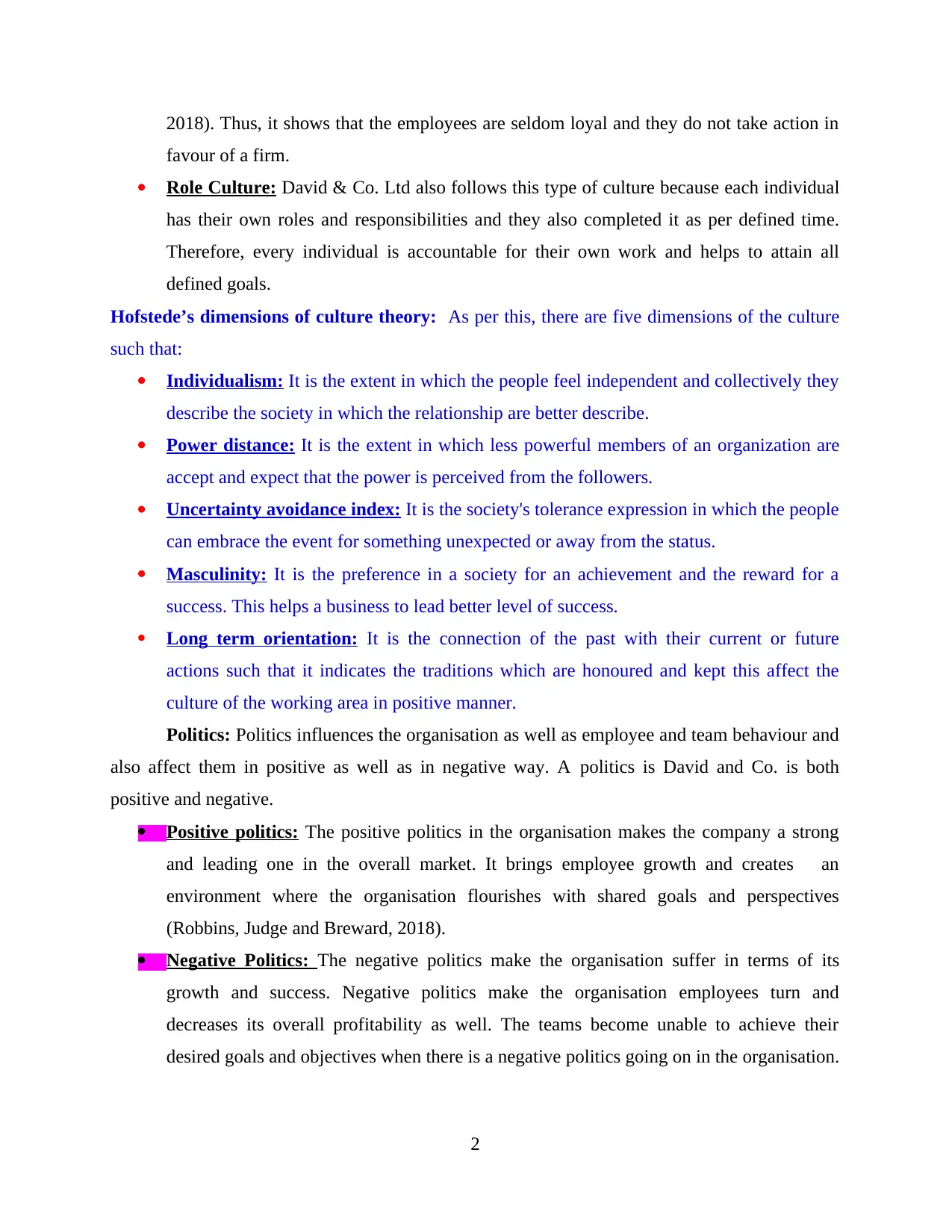
2018). Thus, it shows that the employees are seldom loyal and they do not take action in
favour of a firm.
Role Culture: David & Co. Ltd also follows this type of culture because each individual
has their own roles and responsibilities and they also completed it as per defined time.
Therefore, every individual is accountable for their own work and helps to attain all
defined goals.
Hofstede’s dimensions of culture theory: As per this, there are five dimensions of the culture
such that:
Individualism: It is the extent in which the people feel independent and collectively they
describe the society in which the relationship are better describe.
Power distance: It is the extent in which less powerful members of an organization are
accept and expect that the power is perceived from the followers.
Uncertainty avoidance index: It is the society's tolerance expression in which the people
can embrace the event for something unexpected or away from the status.
Masculinity: It is the preference in a society for an achievement and the reward for a
success. This helps a business to lead better level of success.
Long term orientation: It is the connection of the past with their current or future
actions such that it indicates the traditions which are honoured and kept this affect the
culture of the working area in positive manner.
Politics: Politics influences the organisation as well as employee and team behaviour and
also affect them in positive as well as in negative way. A politics is David and Co. is both
positive and negative.
Positive politics: The positive politics in the organisation makes the company a strong
and leading one in the overall market. It brings employee growth and creates an
environment where the organisation flourishes with shared goals and perspectives
(Robbins, Judge and Breward, 2018).
Negative Politics: The negative politics make the organisation suffer in terms of its
growth and success. Negative politics make the organisation employees turn and
decreases its overall profitability as well. The teams become unable to achieve their
desired goals and objectives when there is a negative politics going on in the organisation.
2
favour of a firm.
Role Culture: David & Co. Ltd also follows this type of culture because each individual
has their own roles and responsibilities and they also completed it as per defined time.
Therefore, every individual is accountable for their own work and helps to attain all
defined goals.
Hofstede’s dimensions of culture theory: As per this, there are five dimensions of the culture
such that:
Individualism: It is the extent in which the people feel independent and collectively they
describe the society in which the relationship are better describe.
Power distance: It is the extent in which less powerful members of an organization are
accept and expect that the power is perceived from the followers.
Uncertainty avoidance index: It is the society's tolerance expression in which the people
can embrace the event for something unexpected or away from the status.
Masculinity: It is the preference in a society for an achievement and the reward for a
success. This helps a business to lead better level of success.
Long term orientation: It is the connection of the past with their current or future
actions such that it indicates the traditions which are honoured and kept this affect the
culture of the working area in positive manner.
Politics: Politics influences the organisation as well as employee and team behaviour and
also affect them in positive as well as in negative way. A politics is David and Co. is both
positive and negative.
Positive politics: The positive politics in the organisation makes the company a strong
and leading one in the overall market. It brings employee growth and creates an
environment where the organisation flourishes with shared goals and perspectives
(Robbins, Judge and Breward, 2018).
Negative Politics: The negative politics make the organisation suffer in terms of its
growth and success. Negative politics make the organisation employees turn and
decreases its overall profitability as well. The teams become unable to achieve their
desired goals and objectives when there is a negative politics going on in the organisation.
2
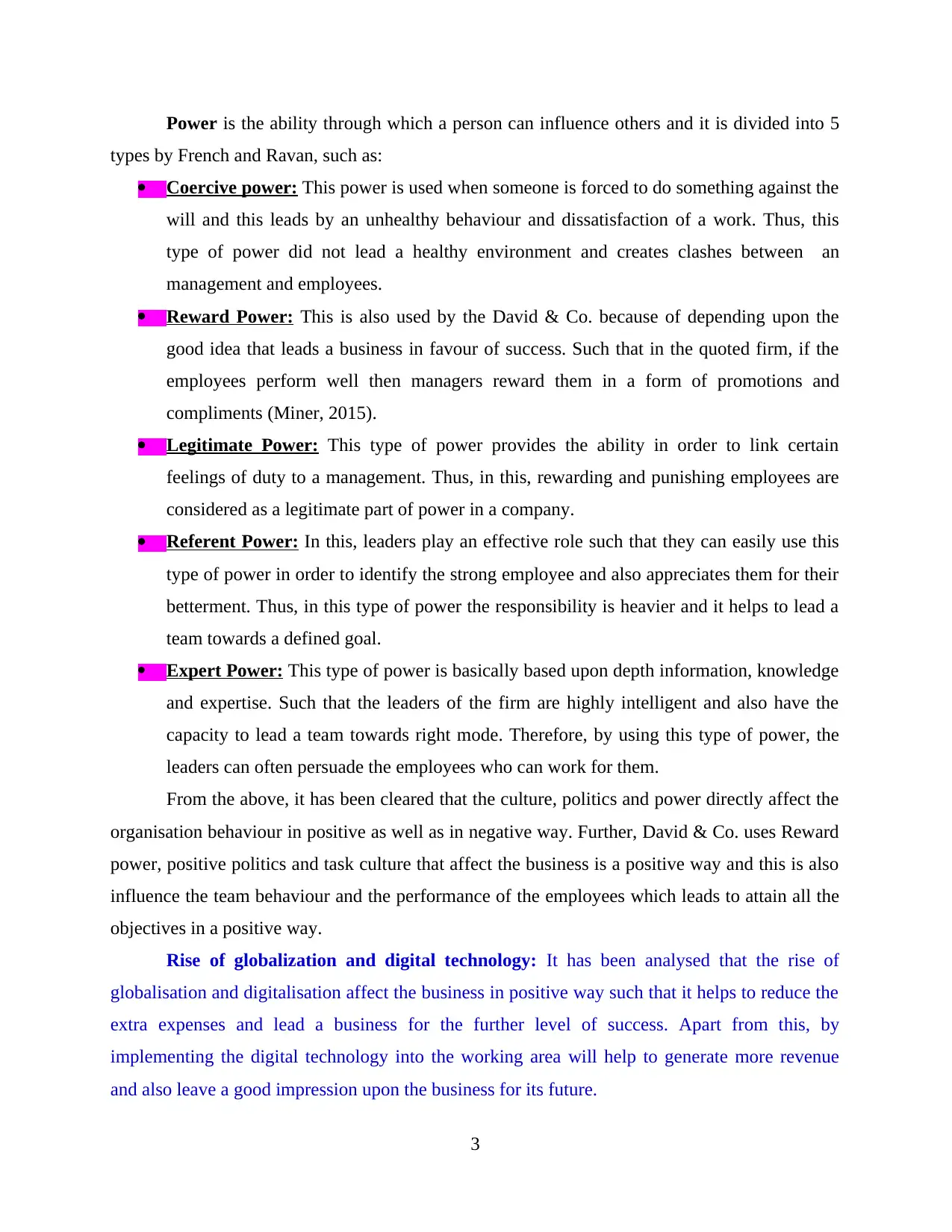
Power is the ability through which a person can influence others and it is divided into 5
types by French and Ravan, such as:
Coercive power: This power is used when someone is forced to do something against the
will and this leads by an unhealthy behaviour and dissatisfaction of a work. Thus, this
type of power did not lead a healthy environment and creates clashes between an
management and employees.
Reward Power: This is also used by the David & Co. because of depending upon the
good idea that leads a business in favour of success. Such that in the quoted firm, if the
employees perform well then managers reward them in a form of promotions and
compliments (Miner, 2015).
Legitimate Power: This type of power provides the ability in order to link certain
feelings of duty to a management. Thus, in this, rewarding and punishing employees are
considered as a legitimate part of power in a company.
Referent Power: In this, leaders play an effective role such that they can easily use this
type of power in order to identify the strong employee and also appreciates them for their
betterment. Thus, in this type of power the responsibility is heavier and it helps to lead a
team towards a defined goal.
Expert Power: This type of power is basically based upon depth information, knowledge
and expertise. Such that the leaders of the firm are highly intelligent and also have the
capacity to lead a team towards right mode. Therefore, by using this type of power, the
leaders can often persuade the employees who can work for them.
From the above, it has been cleared that the culture, politics and power directly affect the
organisation behaviour in positive as well as in negative way. Further, David & Co. uses Reward
power, positive politics and task culture that affect the business is a positive way and this is also
influence the team behaviour and the performance of the employees which leads to attain all the
objectives in a positive way.
Rise of globalization and digital technology: It has been analysed that the rise of
globalisation and digitalisation affect the business in positive way such that it helps to reduce the
extra expenses and lead a business for the further level of success. Apart from this, by
implementing the digital technology into the working area will help to generate more revenue
and also leave a good impression upon the business for its future.
3
types by French and Ravan, such as:
Coercive power: This power is used when someone is forced to do something against the
will and this leads by an unhealthy behaviour and dissatisfaction of a work. Thus, this
type of power did not lead a healthy environment and creates clashes between an
management and employees.
Reward Power: This is also used by the David & Co. because of depending upon the
good idea that leads a business in favour of success. Such that in the quoted firm, if the
employees perform well then managers reward them in a form of promotions and
compliments (Miner, 2015).
Legitimate Power: This type of power provides the ability in order to link certain
feelings of duty to a management. Thus, in this, rewarding and punishing employees are
considered as a legitimate part of power in a company.
Referent Power: In this, leaders play an effective role such that they can easily use this
type of power in order to identify the strong employee and also appreciates them for their
betterment. Thus, in this type of power the responsibility is heavier and it helps to lead a
team towards a defined goal.
Expert Power: This type of power is basically based upon depth information, knowledge
and expertise. Such that the leaders of the firm are highly intelligent and also have the
capacity to lead a team towards right mode. Therefore, by using this type of power, the
leaders can often persuade the employees who can work for them.
From the above, it has been cleared that the culture, politics and power directly affect the
organisation behaviour in positive as well as in negative way. Further, David & Co. uses Reward
power, positive politics and task culture that affect the business is a positive way and this is also
influence the team behaviour and the performance of the employees which leads to attain all the
objectives in a positive way.
Rise of globalization and digital technology: It has been analysed that the rise of
globalisation and digitalisation affect the business in positive way such that it helps to reduce the
extra expenses and lead a business for the further level of success. Apart from this, by
implementing the digital technology into the working area will help to generate more revenue
and also leave a good impression upon the business for its future.
3
⊘ This is a preview!⊘
Do you want full access?
Subscribe today to unlock all pages.

Trusted by 1+ million students worldwide
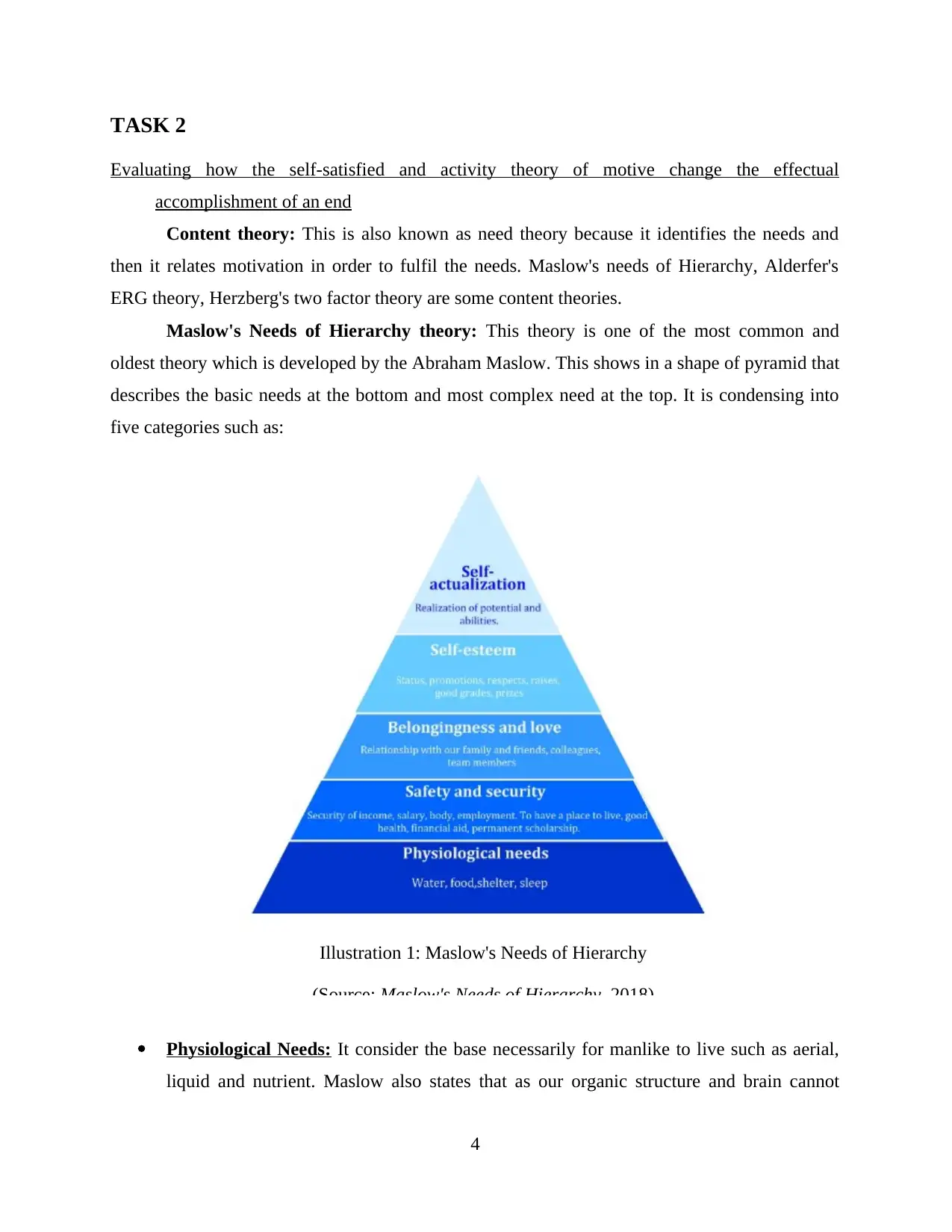
TASK 2
Evaluating how the self-satisfied and activity theory of motive change the effectual
accomplishment of an end
Content theory: This is also known as need theory because it identifies the needs and
then it relates motivation in order to fulfil the needs. Maslow's needs of Hierarchy, Alderfer's
ERG theory, Herzberg's two factor theory are some content theories.
Maslow's Needs of Hierarchy theory: This theory is one of the most common and
oldest theory which is developed by the Abraham Maslow. This shows in a shape of pyramid that
describes the basic needs at the bottom and most complex need at the top. It is condensing into
five categories such as:
Physiological Needs: It consider the base necessarily for manlike to live such as aerial,
liquid and nutrient. Maslow also states that as our organic structure and brain cannot
4
Illustration 1: Maslow's Needs of Hierarchy
(Source: Maslow's Needs of Hierarchy, 2018)
Evaluating how the self-satisfied and activity theory of motive change the effectual
accomplishment of an end
Content theory: This is also known as need theory because it identifies the needs and
then it relates motivation in order to fulfil the needs. Maslow's needs of Hierarchy, Alderfer's
ERG theory, Herzberg's two factor theory are some content theories.
Maslow's Needs of Hierarchy theory: This theory is one of the most common and
oldest theory which is developed by the Abraham Maslow. This shows in a shape of pyramid that
describes the basic needs at the bottom and most complex need at the top. It is condensing into
five categories such as:
Physiological Needs: It consider the base necessarily for manlike to live such as aerial,
liquid and nutrient. Maslow also states that as our organic structure and brain cannot
4
Illustration 1: Maslow's Needs of Hierarchy
(Source: Maslow's Needs of Hierarchy, 2018)
Paraphrase This Document
Need a fresh take? Get an instant paraphrase of this document with our AI Paraphraser
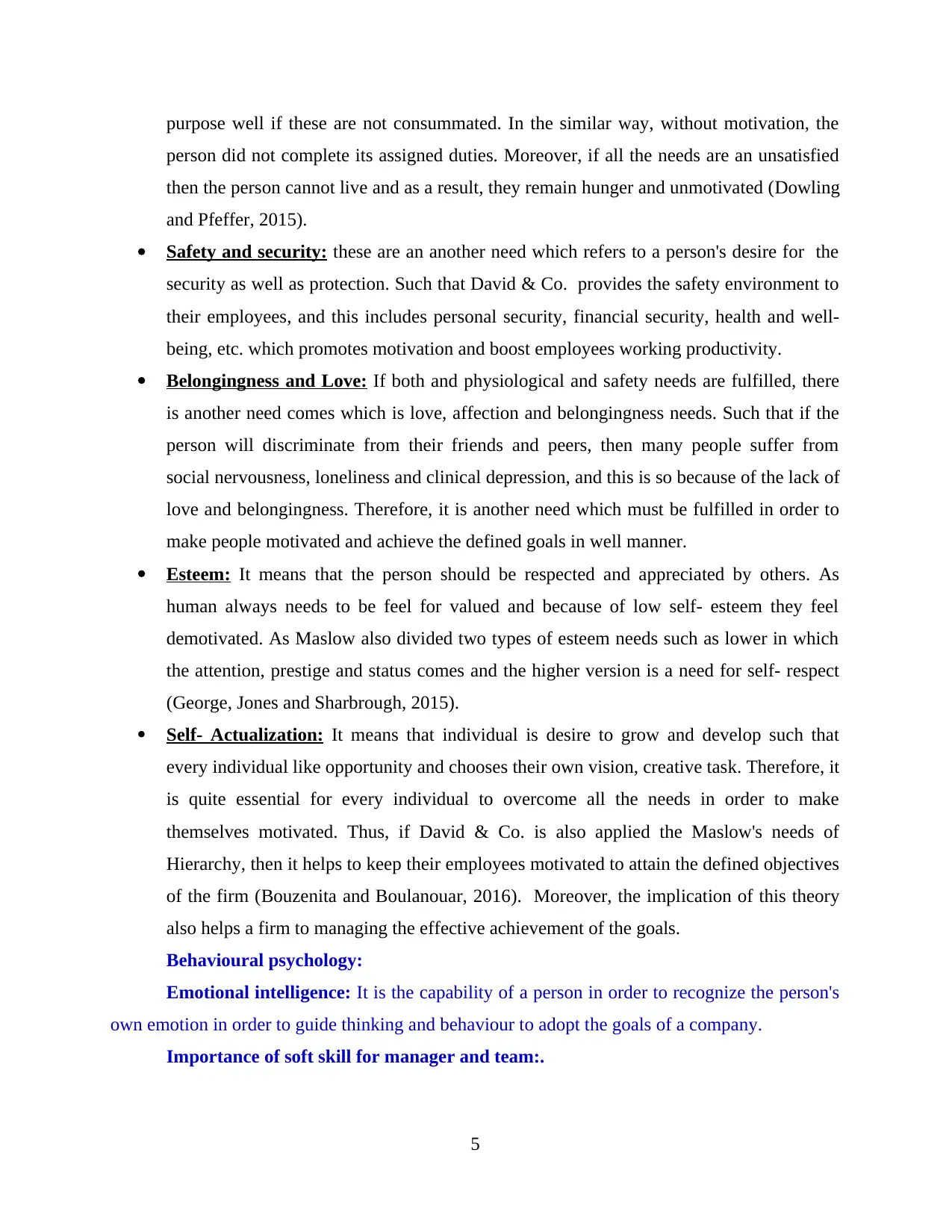
purpose well if these are not consummated. In the similar way, without motivation, the
person did not complete its assigned duties. Moreover, if all the needs are an unsatisfied
then the person cannot live and as a result, they remain hunger and unmotivated (Dowling
and Pfeffer, 2015).
Safety and security: these are an another need which refers to a person's desire for the
security as well as protection. Such that David & Co. provides the safety environment to
their employees, and this includes personal security, financial security, health and well-
being, etc. which promotes motivation and boost employees working productivity.
Belongingness and Love: If both and physiological and safety needs are fulfilled, there
is another need comes which is love, affection and belongingness needs. Such that if the
person will discriminate from their friends and peers, then many people suffer from
social nervousness, loneliness and clinical depression, and this is so because of the lack of
love and belongingness. Therefore, it is another need which must be fulfilled in order to
make people motivated and achieve the defined goals in well manner.
Esteem: It means that the person should be respected and appreciated by others. As
human always needs to be feel for valued and because of low self- esteem they feel
demotivated. As Maslow also divided two types of esteem needs such as lower in which
the attention, prestige and status comes and the higher version is a need for self- respect
(George, Jones and Sharbrough, 2015).
Self- Actualization: It means that individual is desire to grow and develop such that
every individual like opportunity and chooses their own vision, creative task. Therefore, it
is quite essential for every individual to overcome all the needs in order to make
themselves motivated. Thus, if David & Co. is also applied the Maslow's needs of
Hierarchy, then it helps to keep their employees motivated to attain the defined objectives
of the firm (Bouzenita and Boulanouar, 2016). Moreover, the implication of this theory
also helps a firm to managing the effective achievement of the goals.
Behavioural psychology:
Emotional intelligence: It is the capability of a person in order to recognize the person's
own emotion in order to guide thinking and behaviour to adopt the goals of a company.
Importance of soft skill for manager and team:.
5
person did not complete its assigned duties. Moreover, if all the needs are an unsatisfied
then the person cannot live and as a result, they remain hunger and unmotivated (Dowling
and Pfeffer, 2015).
Safety and security: these are an another need which refers to a person's desire for the
security as well as protection. Such that David & Co. provides the safety environment to
their employees, and this includes personal security, financial security, health and well-
being, etc. which promotes motivation and boost employees working productivity.
Belongingness and Love: If both and physiological and safety needs are fulfilled, there
is another need comes which is love, affection and belongingness needs. Such that if the
person will discriminate from their friends and peers, then many people suffer from
social nervousness, loneliness and clinical depression, and this is so because of the lack of
love and belongingness. Therefore, it is another need which must be fulfilled in order to
make people motivated and achieve the defined goals in well manner.
Esteem: It means that the person should be respected and appreciated by others. As
human always needs to be feel for valued and because of low self- esteem they feel
demotivated. As Maslow also divided two types of esteem needs such as lower in which
the attention, prestige and status comes and the higher version is a need for self- respect
(George, Jones and Sharbrough, 2015).
Self- Actualization: It means that individual is desire to grow and develop such that
every individual like opportunity and chooses their own vision, creative task. Therefore, it
is quite essential for every individual to overcome all the needs in order to make
themselves motivated. Thus, if David & Co. is also applied the Maslow's needs of
Hierarchy, then it helps to keep their employees motivated to attain the defined objectives
of the firm (Bouzenita and Boulanouar, 2016). Moreover, the implication of this theory
also helps a firm to managing the effective achievement of the goals.
Behavioural psychology:
Emotional intelligence: It is the capability of a person in order to recognize the person's
own emotion in order to guide thinking and behaviour to adopt the goals of a company.
Importance of soft skill for manager and team:.
5
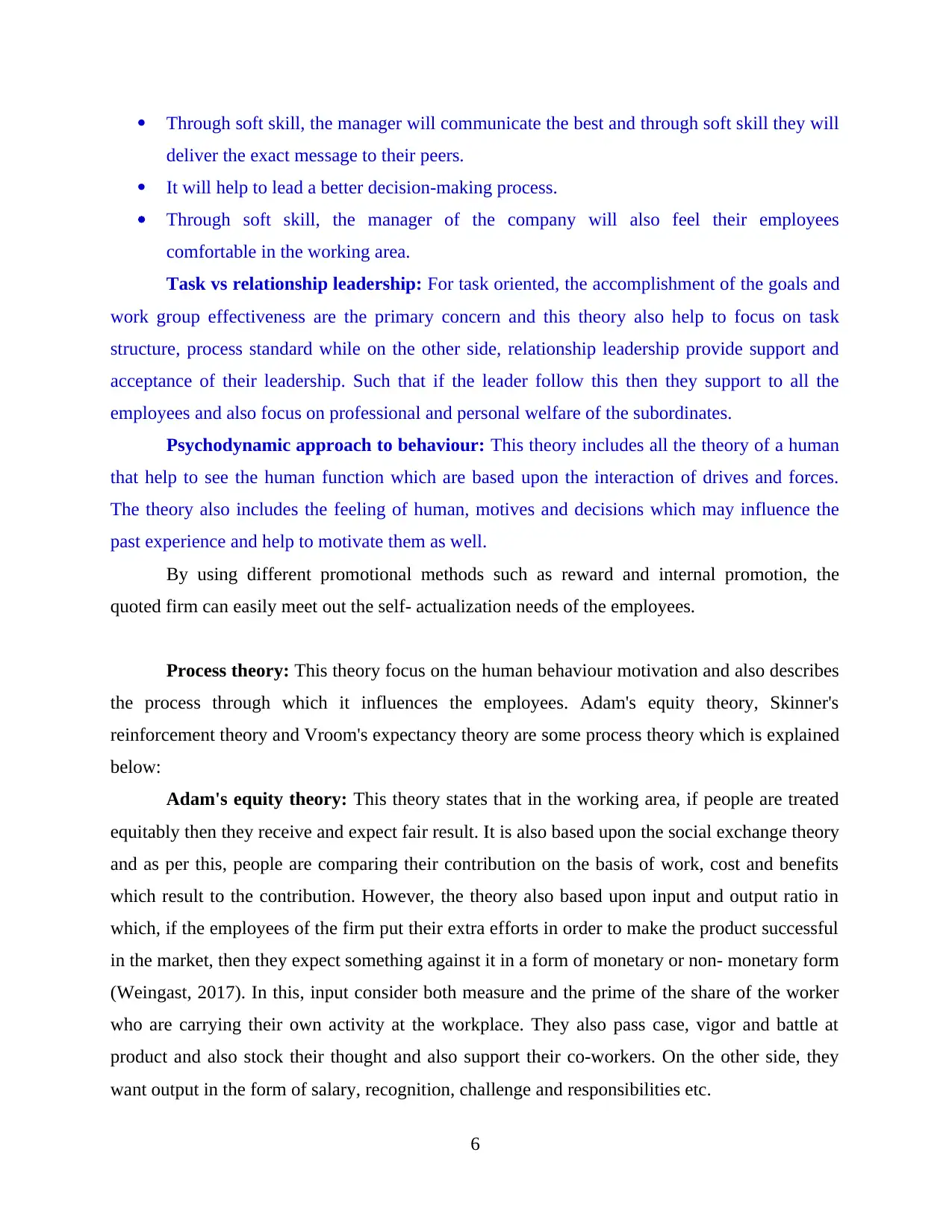
Through soft skill, the manager will communicate the best and through soft skill they will
deliver the exact message to their peers.
It will help to lead a better decision-making process.
Through soft skill, the manager of the company will also feel their employees
comfortable in the working area.
Task vs relationship leadership: For task oriented, the accomplishment of the goals and
work group effectiveness are the primary concern and this theory also help to focus on task
structure, process standard while on the other side, relationship leadership provide support and
acceptance of their leadership. Such that if the leader follow this then they support to all the
employees and also focus on professional and personal welfare of the subordinates.
Psychodynamic approach to behaviour: This theory includes all the theory of a human
that help to see the human function which are based upon the interaction of drives and forces.
The theory also includes the feeling of human, motives and decisions which may influence the
past experience and help to motivate them as well.
By using different promotional methods such as reward and internal promotion, the
quoted firm can easily meet out the self- actualization needs of the employees.
Process theory: This theory focus on the human behaviour motivation and also describes
the process through which it influences the employees. Adam's equity theory, Skinner's
reinforcement theory and Vroom's expectancy theory are some process theory which is explained
below:
Adam's equity theory: This theory states that in the working area, if people are treated
equitably then they receive and expect fair result. It is also based upon the social exchange theory
and as per this, people are comparing their contribution on the basis of work, cost and benefits
which result to the contribution. However, the theory also based upon input and output ratio in
which, if the employees of the firm put their extra efforts in order to make the product successful
in the market, then they expect something against it in a form of monetary or non- monetary form
(Weingast, 2017). In this, input consider both measure and the prime of the share of the worker
who are carrying their own activity at the workplace. They also pass case, vigor and battle at
product and also stock their thought and also support their co-workers. On the other side, they
want output in the form of salary, recognition, challenge and responsibilities etc.
6
deliver the exact message to their peers.
It will help to lead a better decision-making process.
Through soft skill, the manager of the company will also feel their employees
comfortable in the working area.
Task vs relationship leadership: For task oriented, the accomplishment of the goals and
work group effectiveness are the primary concern and this theory also help to focus on task
structure, process standard while on the other side, relationship leadership provide support and
acceptance of their leadership. Such that if the leader follow this then they support to all the
employees and also focus on professional and personal welfare of the subordinates.
Psychodynamic approach to behaviour: This theory includes all the theory of a human
that help to see the human function which are based upon the interaction of drives and forces.
The theory also includes the feeling of human, motives and decisions which may influence the
past experience and help to motivate them as well.
By using different promotional methods such as reward and internal promotion, the
quoted firm can easily meet out the self- actualization needs of the employees.
Process theory: This theory focus on the human behaviour motivation and also describes
the process through which it influences the employees. Adam's equity theory, Skinner's
reinforcement theory and Vroom's expectancy theory are some process theory which is explained
below:
Adam's equity theory: This theory states that in the working area, if people are treated
equitably then they receive and expect fair result. It is also based upon the social exchange theory
and as per this, people are comparing their contribution on the basis of work, cost and benefits
which result to the contribution. However, the theory also based upon input and output ratio in
which, if the employees of the firm put their extra efforts in order to make the product successful
in the market, then they expect something against it in a form of monetary or non- monetary form
(Weingast, 2017). In this, input consider both measure and the prime of the share of the worker
who are carrying their own activity at the workplace. They also pass case, vigor and battle at
product and also stock their thought and also support their co-workers. On the other side, they
want output in the form of salary, recognition, challenge and responsibilities etc.
6
⊘ This is a preview!⊘
Do you want full access?
Subscribe today to unlock all pages.

Trusted by 1+ million students worldwide
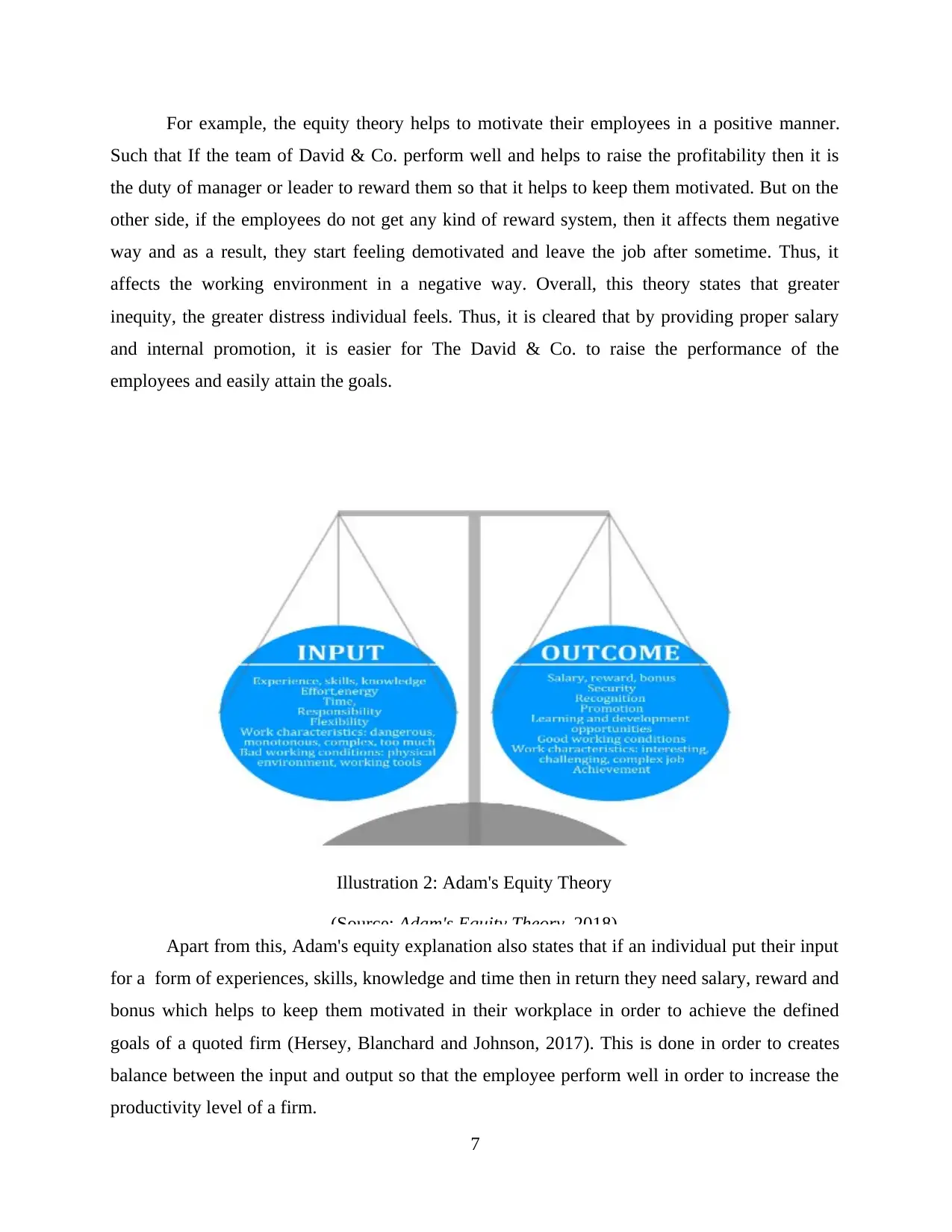
For example, the equity theory helps to motivate their employees in a positive manner.
Such that If the team of David & Co. perform well and helps to raise the profitability then it is
the duty of manager or leader to reward them so that it helps to keep them motivated. But on the
other side, if the employees do not get any kind of reward system, then it affects them negative
way and as a result, they start feeling demotivated and leave the job after sometime. Thus, it
affects the working environment in a negative way. Overall, this theory states that greater
inequity, the greater distress individual feels. Thus, it is cleared that by providing proper salary
and internal promotion, it is easier for The David & Co. to raise the performance of the
employees and easily attain the goals.
Apart from this, Adam's equity explanation also states that if an individual put their input
for a form of experiences, skills, knowledge and time then in return they need salary, reward and
bonus which helps to keep them motivated in their workplace in order to achieve the defined
goals of a quoted firm (Hersey, Blanchard and Johnson, 2017). This is done in order to creates
balance between the input and output so that the employee perform well in order to increase the
productivity level of a firm.
7
Illustration 2: Adam's Equity Theory
(Source: Adam's Equity Theory, 2018)
Such that If the team of David & Co. perform well and helps to raise the profitability then it is
the duty of manager or leader to reward them so that it helps to keep them motivated. But on the
other side, if the employees do not get any kind of reward system, then it affects them negative
way and as a result, they start feeling demotivated and leave the job after sometime. Thus, it
affects the working environment in a negative way. Overall, this theory states that greater
inequity, the greater distress individual feels. Thus, it is cleared that by providing proper salary
and internal promotion, it is easier for The David & Co. to raise the performance of the
employees and easily attain the goals.
Apart from this, Adam's equity explanation also states that if an individual put their input
for a form of experiences, skills, knowledge and time then in return they need salary, reward and
bonus which helps to keep them motivated in their workplace in order to achieve the defined
goals of a quoted firm (Hersey, Blanchard and Johnson, 2017). This is done in order to creates
balance between the input and output so that the employee perform well in order to increase the
productivity level of a firm.
7
Illustration 2: Adam's Equity Theory
(Source: Adam's Equity Theory, 2018)
Paraphrase This Document
Need a fresh take? Get an instant paraphrase of this document with our AI Paraphraser
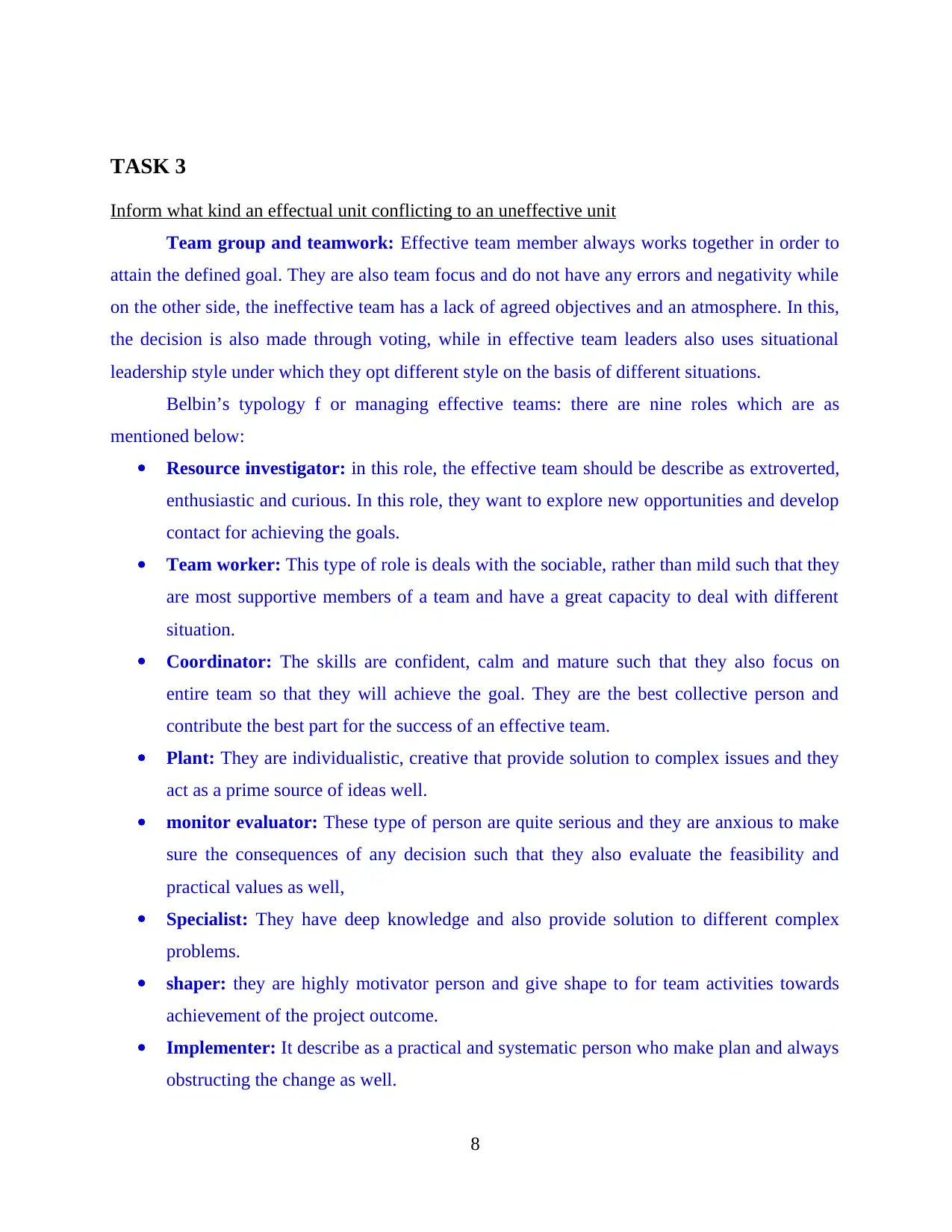
TASK 3
Inform what kind an effectual unit conflicting to an uneffective unit
Team group and teamwork: Effective team member always works together in order to
attain the defined goal. They are also team focus and do not have any errors and negativity while
on the other side, the ineffective team has a lack of agreed objectives and an atmosphere. In this,
the decision is also made through voting, while in effective team leaders also uses situational
leadership style under which they opt different style on the basis of different situations.
Belbin’s typology f or managing effective teams: there are nine roles which are as
mentioned below:
Resource investigator: in this role, the effective team should be describe as extroverted,
enthusiastic and curious. In this role, they want to explore new opportunities and develop
contact for achieving the goals.
Team worker: This type of role is deals with the sociable, rather than mild such that they
are most supportive members of a team and have a great capacity to deal with different
situation.
Coordinator: The skills are confident, calm and mature such that they also focus on
entire team so that they will achieve the goal. They are the best collective person and
contribute the best part for the success of an effective team.
Plant: They are individualistic, creative that provide solution to complex issues and they
act as a prime source of ideas well.
monitor evaluator: These type of person are quite serious and they are anxious to make
sure the consequences of any decision such that they also evaluate the feasibility and
practical values as well,
Specialist: They have deep knowledge and also provide solution to different complex
problems.
shaper: they are highly motivator person and give shape to for team activities towards
achievement of the project outcome.
Implementer: It describe as a practical and systematic person who make plan and always
obstructing the change as well.
8
Inform what kind an effectual unit conflicting to an uneffective unit
Team group and teamwork: Effective team member always works together in order to
attain the defined goal. They are also team focus and do not have any errors and negativity while
on the other side, the ineffective team has a lack of agreed objectives and an atmosphere. In this,
the decision is also made through voting, while in effective team leaders also uses situational
leadership style under which they opt different style on the basis of different situations.
Belbin’s typology f or managing effective teams: there are nine roles which are as
mentioned below:
Resource investigator: in this role, the effective team should be describe as extroverted,
enthusiastic and curious. In this role, they want to explore new opportunities and develop
contact for achieving the goals.
Team worker: This type of role is deals with the sociable, rather than mild such that they
are most supportive members of a team and have a great capacity to deal with different
situation.
Coordinator: The skills are confident, calm and mature such that they also focus on
entire team so that they will achieve the goal. They are the best collective person and
contribute the best part for the success of an effective team.
Plant: They are individualistic, creative that provide solution to complex issues and they
act as a prime source of ideas well.
monitor evaluator: These type of person are quite serious and they are anxious to make
sure the consequences of any decision such that they also evaluate the feasibility and
practical values as well,
Specialist: They have deep knowledge and also provide solution to different complex
problems.
shaper: they are highly motivator person and give shape to for team activities towards
achievement of the project outcome.
Implementer: It describe as a practical and systematic person who make plan and always
obstructing the change as well.
8
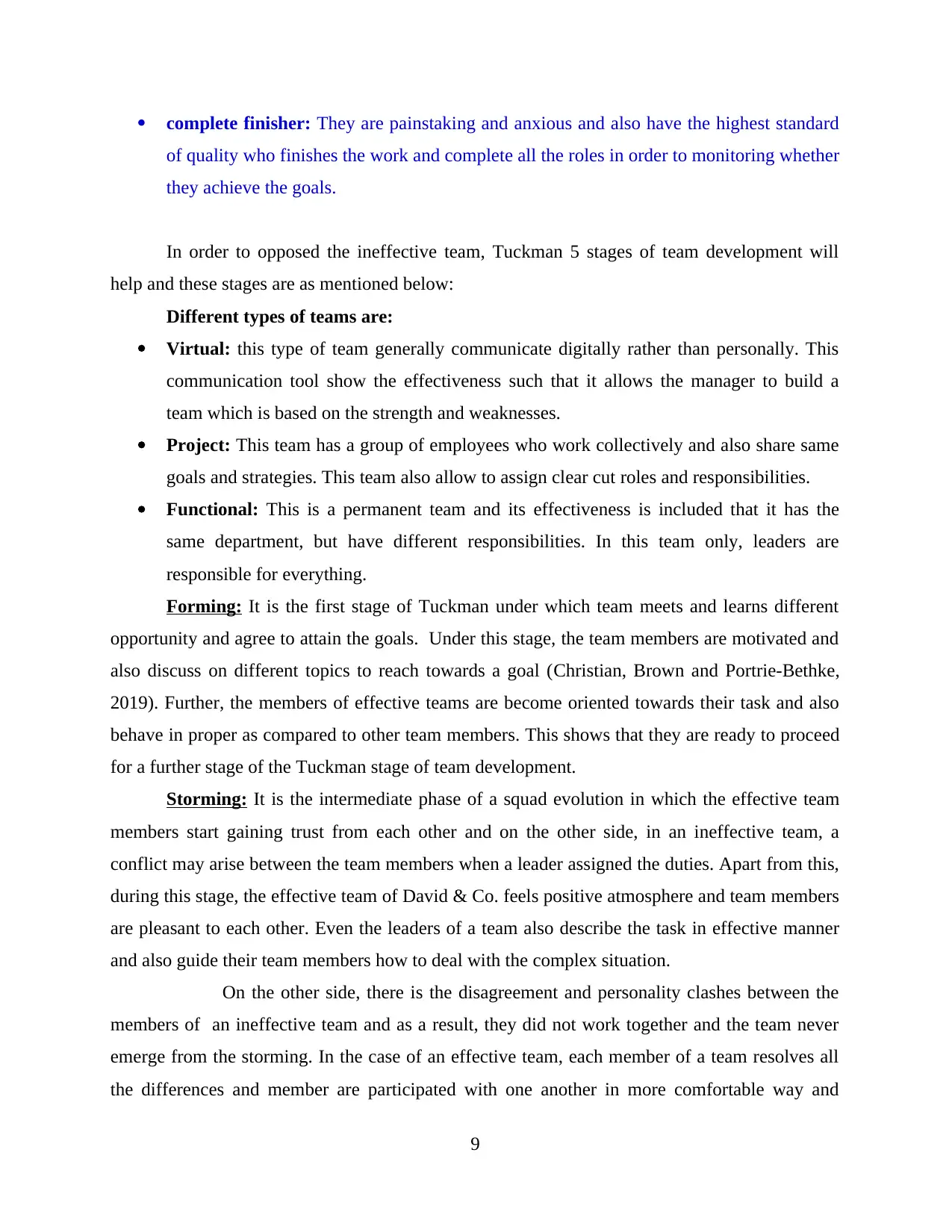
complete finisher: They are painstaking and anxious and also have the highest standard
of quality who finishes the work and complete all the roles in order to monitoring whether
they achieve the goals.
In order to opposed the ineffective team, Tuckman 5 stages of team development will
help and these stages are as mentioned below:
Different types of teams are:
Virtual: this type of team generally communicate digitally rather than personally. This
communication tool show the effectiveness such that it allows the manager to build a
team which is based on the strength and weaknesses.
Project: This team has a group of employees who work collectively and also share same
goals and strategies. This team also allow to assign clear cut roles and responsibilities.
Functional: This is a permanent team and its effectiveness is included that it has the
same department, but have different responsibilities. In this team only, leaders are
responsible for everything.
Forming: It is the first stage of Tuckman under which team meets and learns different
opportunity and agree to attain the goals. Under this stage, the team members are motivated and
also discuss on different topics to reach towards a goal (Christian, Brown and Portrie-Bethke,
2019). Further, the members of effective teams are become oriented towards their task and also
behave in proper as compared to other team members. This shows that they are ready to proceed
for a further stage of the Tuckman stage of team development.
Storming: It is the intermediate phase of a squad evolution in which the effective team
members start gaining trust from each other and on the other side, in an ineffective team, a
conflict may arise between the team members when a leader assigned the duties. Apart from this,
during this stage, the effective team of David & Co. feels positive atmosphere and team members
are pleasant to each other. Even the leaders of a team also describe the task in effective manner
and also guide their team members how to deal with the complex situation.
On the other side, there is the disagreement and personality clashes between the
members of an ineffective team and as a result, they did not work together and the team never
emerge from the storming. In the case of an effective team, each member of a team resolves all
the differences and member are participated with one another in more comfortable way and
9
of quality who finishes the work and complete all the roles in order to monitoring whether
they achieve the goals.
In order to opposed the ineffective team, Tuckman 5 stages of team development will
help and these stages are as mentioned below:
Different types of teams are:
Virtual: this type of team generally communicate digitally rather than personally. This
communication tool show the effectiveness such that it allows the manager to build a
team which is based on the strength and weaknesses.
Project: This team has a group of employees who work collectively and also share same
goals and strategies. This team also allow to assign clear cut roles and responsibilities.
Functional: This is a permanent team and its effectiveness is included that it has the
same department, but have different responsibilities. In this team only, leaders are
responsible for everything.
Forming: It is the first stage of Tuckman under which team meets and learns different
opportunity and agree to attain the goals. Under this stage, the team members are motivated and
also discuss on different topics to reach towards a goal (Christian, Brown and Portrie-Bethke,
2019). Further, the members of effective teams are become oriented towards their task and also
behave in proper as compared to other team members. This shows that they are ready to proceed
for a further stage of the Tuckman stage of team development.
Storming: It is the intermediate phase of a squad evolution in which the effective team
members start gaining trust from each other and on the other side, in an ineffective team, a
conflict may arise between the team members when a leader assigned the duties. Apart from this,
during this stage, the effective team of David & Co. feels positive atmosphere and team members
are pleasant to each other. Even the leaders of a team also describe the task in effective manner
and also guide their team members how to deal with the complex situation.
On the other side, there is the disagreement and personality clashes between the
members of an ineffective team and as a result, they did not work together and the team never
emerge from the storming. In the case of an effective team, each member of a team resolves all
the differences and member are participated with one another in more comfortable way and
9
⊘ This is a preview!⊘
Do you want full access?
Subscribe today to unlock all pages.

Trusted by 1+ million students worldwide
1 out of 18
Related Documents
Your All-in-One AI-Powered Toolkit for Academic Success.
+13062052269
info@desklib.com
Available 24*7 on WhatsApp / Email
![[object Object]](/_next/static/media/star-bottom.7253800d.svg)
Unlock your academic potential
Copyright © 2020–2026 A2Z Services. All Rights Reserved. Developed and managed by ZUCOL.





